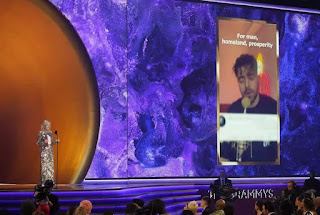Iranian artist, Shervin Hajipour, never
dreamed that his two-and-a-half-minute ballad would be watched on Instagram by
more than 60 million viewers. Gathering comments from online tweets, Shervin
composed an emotional song about Iranians angry at an oppressive government and
desperately yearning for a better life whose children were forced to “pick
through the trash in search of their dreams.”
Just eleven days after the unjust death of
Mahsa Amini, Shervin posted a video of himself singing, “Baraye” on Instagram.
The video immediately went viral! He was arrested just two days later and
forced to remove the popular video and shut down his Instagram account. The
25-year-old singer was summoned to the police station and charged with encouraging
riots and acting against national security.
Despite being arrested and forced to
remove the video, his song, “Baraye” refused to die in the hearts of Iranians
and people all over the world. “Baraye” soon became an anthem song for
worldwide protests and rallies. By October 1, crowds of Iranians around the
world in over 200 cities, marched through the streets singing along to the
lyrics of the song.
“But it didn’t stop there!”
People began calling for Hajipour’s song
to be nominated for a Grammy in the “best song for social change,” category.
Almost immediately, “Baraye” received 95,000 submissions for a Grammy award,
according to the Recording Academy. Shervin had found a profound connection in
the hearts of millions of people putting a “face” on the sufferings of
Iranians. Recording Academy CEO, Harvey
Mason Jr, declared in a public statement, “The Academy steadfastly supports
freedom of expression and art that’s created to empower communities in need.
Because music serves the world, and the Recording Academy exists to serve
music.”
Responding
to intense worldwide pressure, Shervin Hajipour was released on bail on October
4, facing charges of spreading propaganda against the regime and encouraging
and inciting people to acts of violence. The Islamic Republic of Iran is notorious for squelching freedom of
expression in the arts and has in the past imprisoned musicians, film
directors, and dancers. Shervin Hajipour is one more example of this regime’s
desperate attempt to control the minds of talented musicians who threaten their existence.
Since “Baraye” was written and sung in
Farsi, there was a demand that the song be translated into English so it could enjoy a greater reach among the people. Iranian-American singer,
Rana Mansour, composed a popular version in English on YouTube, entitling it,
“Woman, Life, Liberty.”
On February 5, 2023, Shervin's anthem for the "Woman, life, freedom" uprising won a Grammy Award for best song in a "social change category., presented by First Lady, Jill Biden. A few months after receiving the award, He was sentenced to three years and eight months in prison for "spreading propaganda against the Iranian regime, and inciting unrest against national security. In addition to the sentence, Hajipour has been ordered to write an anti-US song as punishment for his very popular award-winning anthem that took the world by storm. Shervin must craft his song about the atrocities committed by the U.S. It is blatantly obvious that this evil regime is seriously jealous of the overwhelming support that his anthem protest song received across the globe. By writing his song, Shervin Hajipour has "put a face" on every suffering Iranian, becoming a powerful voice for their human rights, something that is absolutely forbidden by this dictatorship government!

